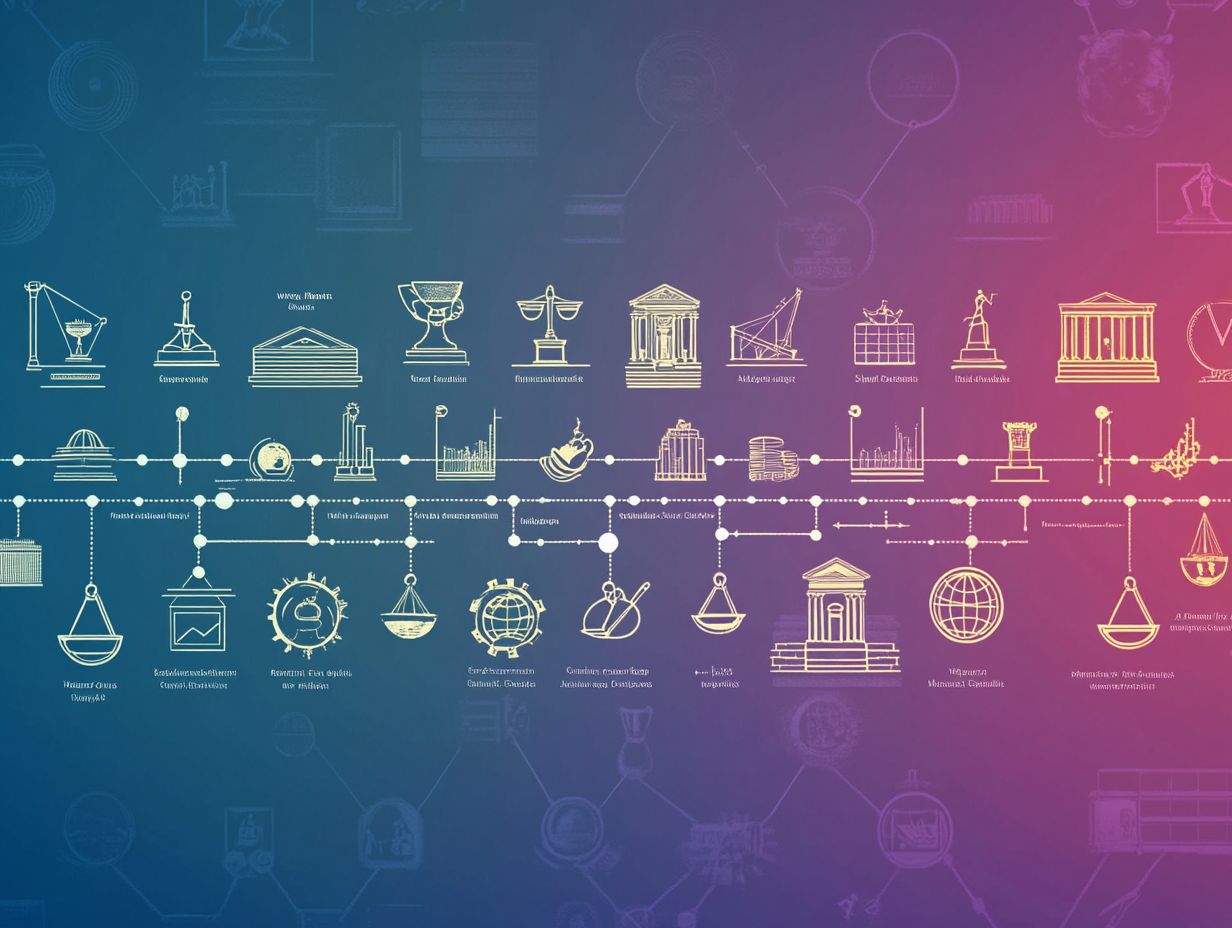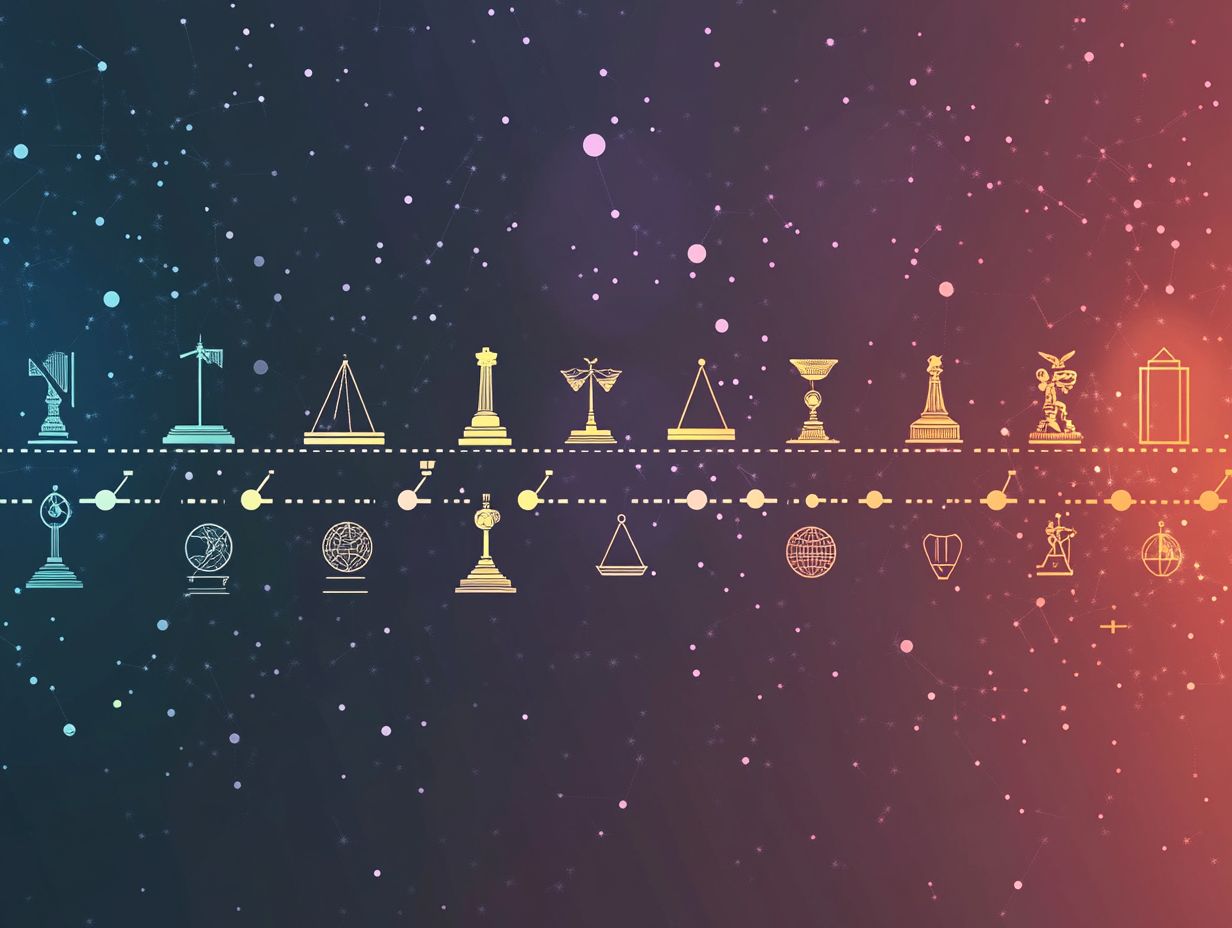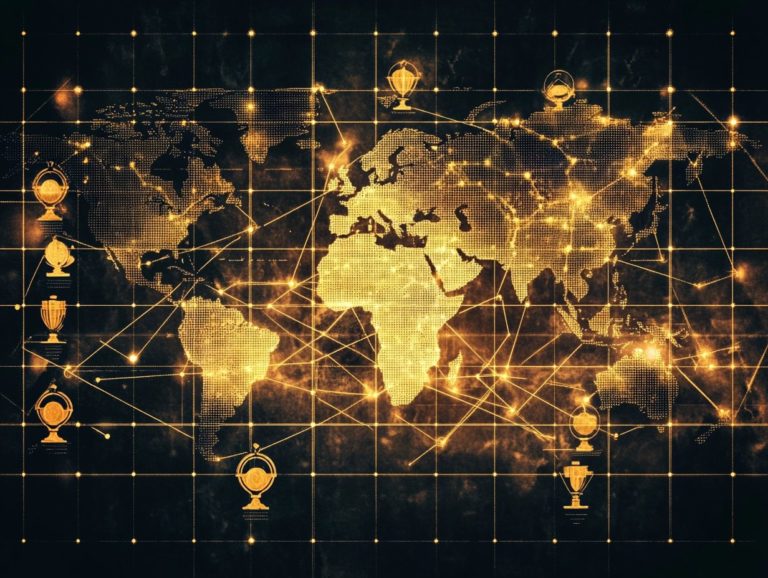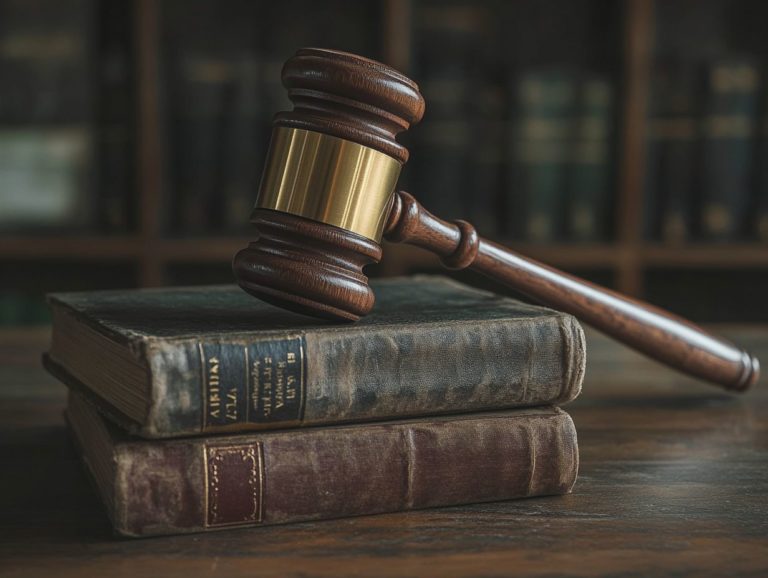The Evolution of IP Litigation Over the Decades
Intellectual Property (IP) litigation has evolved significantly, reflecting the fast-paced relationship between innovation and legal systems.
This exploration defines IP litigation and traces its origins from landmark cases to key transformations in the 20th century, driven by technology.
You stand at the exciting crossroads of emerging technologies and globalization, creating new challenges and trends.
Dive into the dynamic world of IP litigation today!
Contents
- Key Takeaways:
- Overview of IP Litigation
- The Early Years of IP Litigation
- Changes in IP Litigation in the 20th Century
- Current Trends in IP Litigation
- The Future of IP Litigation
- Preguntas Frecuentes
- Cu l es la historia de las litigaciones de propiedad intelectual?
- C mo ha cambiado la litigaci n de propiedad intelectual a lo largo de los a os?
- Cu les son los principales desaf os en la litigaci n de propiedad intelectual hoy en d a?
- C mo ha cambiado el papel de los abogados de propiedad intelectual a lo largo del tiempo?
- Qu impacto ha tenido la tecnolog a en la litigaci n de propiedad intelectual?
- Cu l es el futuro de la litigaci n de propiedad intelectual?
Key Takeaways:

IP litigation has evolved significantly over the decades, driven by technological advancements and changes in legal frameworks.
Emerging technologies and globalization impact current trends in IP litigation. For insights on this dynamic landscape, explore the evolution of IP strategy in the tech sector. Expect new developments and challenges as technology advances and international disputes rise.
Overview of IP Litigation
Intellectual property (IP) litigation helps you protect your rights over patents, copyrights, and trademarks.
It safeguards your innovative creations and ideas from unauthorized use. This area includes legal disputes involving companies that hold patents but do not make products.
This underlines the critical need for enforcement and protection in this complex legal landscape.
Definition and Purpose
Intellectual property litigation refers to legal actions you take to protect your rights linked to your creations, trademarks, and copyrights.
This process safeguards the interests of inventors, artists, and businesses, ensuring your unique contributions remain secure.
By navigating patent law, trademark law, and copyright law, you can assert your rights against infringement and seek remedies for violations.
IP litigation fosters a culture of innovation and creativity, assuring you that your contributions will be recognized in a competitive marketplace.
The Early Years of IP Litigation
The early years of IP litigation laid foundational legal frameworks and key historical cases that shaped modern intellectual property rights, influencing the relationship between IP litigation and market trends.
The Statute of Anne in 1710 and the Patent Act of 1790 were crucial in establishing copyright and patent protections, shaping today s intellectual property landscape.
Key Milestones and Landmark Cases
Landmark cases in IP litigation have shaped legal interpretations and enforcement practices, profoundly influencing the protection of your rights.
For example, the decision in Harper & Row Publishers, Inc. v. Nation Enterprises highlighted fair use, while eBay Inc. v. MercExchange, L.L.C. established new standards for injunctions in patent cases.
These precedents define copyright and patent law, guiding you in developing litigation strategies.
The evolution of IP law thrives on the ongoing dialogue between court interpretations and legislative reforms, showcasing the dynamic nature of intellectual property today.
Changes in IP Litigation in the 20th Century

The 20th century brought transformative changes in IP litigation, driven by technology and evolving legal systems, setting the stage for the future of IP litigation in a digital age.
These changes reshaped the enforcement of intellectual property rights across various industries, marking a crucial era for protecting creativity and innovation.
Impact of Technological Advancements
Technological advancements have greatly changed IP litigation, leading to the rise of online IP litigation cases that introduce new inventions and creative processes, demanding updated legal protections and enforcement mechanisms.
As you harness cutting-edge tools like artificial intelligence and blockchain, the intricacies of laws that protect creations of the mind are evolving rapidly. This shift has led to unique disputes, particularly concerning ownership rights and patent execution.
The digital landscape presents challenges regarding copyright infringement. Content creators navigate a complex web of online platforms that may not fully respect their rights. Legal professionals must adapt existing frameworks to address these issues.
This adaptation is crucial to ensuring that intellectual property remains protected in an ever-changing environment.
Shifts in Legal Framework
Changes in the legal framework governing IP litigation reveal the dynamic nature of intellectual property rights and the ongoing need for reforms to address emerging challenges in the U.S. legal landscape, including the role of the internet in IP litigation.
Over the past century, these transformations have been greatly influenced by technological advancements and globalization. This compels a reevaluation of existing laws.
Policies like the Copyright Act of 1976 and its amendments show how lawmakers have adapted to the evolving landscape of digital distribution and reproduction capabilities.
Landmark court cases like Sony Corp. v. Universal City Studios and Google LLC v. Oracle America have pushed the boundaries of copyright law, igniting debates around fair use and software protection.
These reforms are not just legal formalities; they reflect a broader acknowledgment of the importance of innovation and creativity in today’s interconnected world.
Current Trends in IP Litigation
Current trends in IP litigation are significantly influenced by emerging technologies and globalization, particularly highlighted in the impact of digital transformation on IP litigation.
This landscape reflects the intricate challenges of safeguarding intellectual property rights in an ever-connected world.
Emerging Technologies and Industries
Emerging technologies like artificial intelligence, blockchain, and biotech are reshaping the legal landscape. You need to reevaluate your approach to patent protections and enforcement strategies.
As these innovations evolve, they bring unique challenges that traditional legal frameworks often struggle to address.
For example, AI’s ability to generate novel inventions raises questions about inventorship and ownership rights. Blockchain s decentralized nature complicates conventional licensing agreements.
In the biotech sector, you may see an increase in patent disputes over genetic modifications and personalized medicine. This necessitates reassessing your intellectual property strategies.
This shifting landscape presents challenges but also exciting opportunities. By adapting your approach, you can better protect your innovations and explore collaborative ventures in a competitive market.
Globalization and International Disputes

Globalization has spurred a rise in international disputes surrounding intellectual property rights. Collaborative approaches to enforcement and litigation across borders are now necessary.
As you expand into new markets, you encounter differing legal frameworks. It is crucial for countries to unite in resolving these disputes effectively.
The emergence of multinational corporations and the surge of digital platforms have created a complex landscape where intellectual property infringement can swiftly transcend national boundaries.
Fostering international cooperation is essential to tackle the challenges these violations present. Countries must engage in dialogues that harmonize legal standards and promote cohesive litigation strategies.
Now is the time to adapt your strategies to the fast-changing legal landscape. Embrace these changes to stay ahead in the competitive market!
The Future of IP Litigation
The future of IP litigation is on the brink of transformation, fueled by advancements in technology and the evolution of legal frameworks, as explored in the global landscape of IP litigation today.
These changes will effectively address emerging challenges in enforcement and rights protection, paving the way for a more robust landscape in intellectual property law.
Predicted Developments and Challenges
Predicted developments in technology and shifts in legal paradigms are likely to present new challenges for IP litigation, requiring ongoing changes to ensure effective rights protection.
As innovations like artificial intelligence and blockchain continue to evolve, traditional frameworks governing intellectual property may struggle to keep pace. The integration of AI into the creative process raises significant questions about authorship and ownership issues that current laws often fail to address adequately.
Meanwhile, blockchain technology introduces smart contracts self-executing contracts with terms directly written into code that enhance rights management but also complicate the enforcement of existing IP laws.
These rapid advancements present a dual challenge: navigating a landscape where legal systems must adapt swiftly while ensuring fairness and clarity. As a stakeholder, it is crucial to maneuver through this evolving terrain, balancing technological advancement with legal integrity.
Preguntas Frecuentes
Cu l es la historia de las litigaciones de propiedad intelectual?
Las litigaciones de propiedad intelectual, o las disputas legales sobre derechos de propiedad intelectual, tienen una historia larga y compleja que abarca varias d cadas. Comenzaron a principios del siglo XX con el aumento de demandas por infracci n de patentes y han evolucionado para incluir una amplia gama de cuestiones de propiedad intelectual, incluidas marcas comerciales, derechos de autor y secretos comerciales.
C mo ha cambiado la litigaci n de propiedad intelectual a lo largo de los a os?

La litigaci n de propiedad intelectual ha experimentado cambios significativos en las ltimas d cadas. Con el auge de la tecnolog a y la globalizaci n, el n mero y la complejidad de las disputas de propiedad intelectual han aumentado dr sticamente. Adem s, las leyes y regulaciones que rodean la propiedad intelectual tambi n han evolucionado, afectando la manera en que se manejan estas disputas.
Cu les son los principales desaf os en la litigaci n de propiedad intelectual hoy en d a?
Uno de los mayores desaf os en la litigaci n de propiedad intelectual hoy en d a es el r pido ritmo de la innovaci n tecnol gica. Esto dificulta que las leyes y regulaciones se mantengan al d a, lo que conduce a la ambig edad y la incertidumbre en las disputas de propiedad intelectual. Adem s, la naturaleza global de los negocios modernos ha hecho que sea m s dif cil hacer cumplir los derechos de propiedad intelectual a trav s de las fronteras.
C mo ha cambiado el papel de los abogados de propiedad intelectual a lo largo del tiempo?
Los abogados de propiedad intelectual han tenido que adaptarse y evolucionar su enfoque hacia la litigaci n a medida que el campo ha cambiado. En el pasado, era m s com n que los abogados de propiedad intelectual se centraran en un rea espec fica, como patentes o marcas comerciales. Sin embargo, con la creciente complejidad de las disputas de propiedad intelectual, los abogados ahora necesitan tener un entendimiento amplio de todos los aspectos de la ley de propiedad intelectual.
Qu impacto ha tenido la tecnolog a en la litigaci n de propiedad intelectual?
La tecnolog a ha tenido un impacto significativo en la litigaci n de propiedad intelectual, tanto en t rminos de generar nuevas disputas como de proporcionar herramientas para manejarlas. El auge del contenido digital y las plataformas en l nea ha llevado a un aumento en los casos de infracci n de derechos de autor, mientras que los avances en software y an lisis de datos han mejorado la eficiencia y precisi n de la litigaci n de propiedad intelectual.
Cu l es el futuro de la litigaci n de propiedad intelectual?
El futuro de la litigaci n de propiedad intelectual ser moldeado por avances tecnol gicos y cambios en el comercio global. A medida que las empresas se vuelven m s interconectadas y digitales, aumentar n las disputas de propiedad intelectual entre pa ses.
El uso de inteligencia artificial y tecnolog a blockchain jugar un papel importante en la resoluci n de estas disputas. Estas innovaciones podr an hacer que el proceso sea m s r pido y eficiente.






